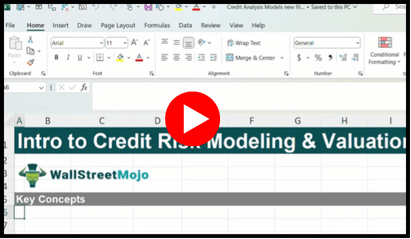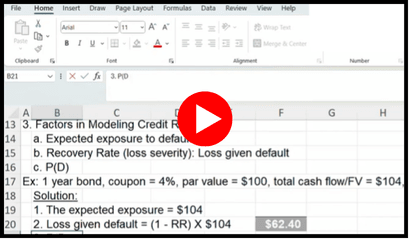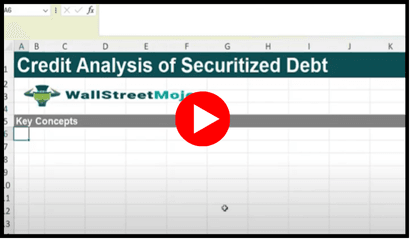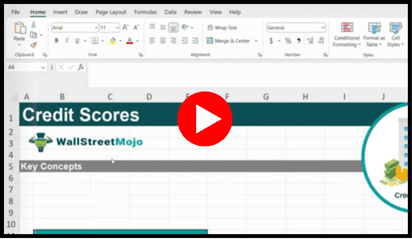Opt for our program on fundamentals of Credit Analysis course to learn about credit valuation analysis of debt instruments in detail. On enrollment, earn huge benefits like unlimited access to the course content and training resources for one year. Have a versatile environment to learn the concepts at your own pace with our pre-recorded modules. Additionally, have a look at our real-world examples to understand the practical application of highly advanced technical indicators. You also earn Credit Analysis certification upon completion of the course, which further opens better career and job opportunities for you!
Fundamentals of Credit Analysis Course!!
Fundamentals of Credit Analysis Course | Master the Art of Credit Risk Assessment & Bond Valuation | Learn How to Evaluate Creditworthiness & Manage Bond Risks Like a Pro | Enroll Now & Enhance Your Credit Analysis Skills!FLASH SALE!
Claim Your 60% + 20% OFF
FLASH SALE is here, and your chance to upskill has never been better.
💰 Get 60% +20% off (WSM20)
📈 Master financial modeling skills with expert-led training.
🕒 Learn anytime, anywhere, and boost your career prospects without breaking the bank.
🔥 Hurry - this FLASH SALE is live for a limited time only.

HIGHLIGHTS
Key Features & Highlights (What Will You Get?)
1-Year Unlimited Access
1-Year Unlimited Access : Learn at your own pace from anywhere in the worldSelf-Paced Video Tutorials
Self-Paced Video Tutorials : 3+ hours of comprehensive lessonsCertification of Completion
Certification of Completion : Boost your credentials with an industry-recognized certificateCredit Risk Assessment
Credit Risk Assessment : Learn to assess and evaluate bond risks and creditworthinessReal-World Applications
Real-World Applications : Apply practical credit analysis techniques to real-life scenariosExcel-Based Valuation Techniques
Excel-Based Valuation Techniques : Master Excel calculations for bond valuation adjustmentsCREDIT ANALYSIS COURSE PREVIEW
Sample Videos
HURRY UP!
Unlock Premium Course Benefits Worth $500+!
Master Credit Risk Techniques
Master Credit Risk Techniques : Learn how to assess bond risks and creditworthinessReal-World Credit Analysis Case Studies
Real-World Credit Analysis Case Studies : Apply your skills with practical examples and real-life casesArbitrage Valuation Frameworks
Arbitrage Valuation Frameworks : Learn how to use arbitrage models for credit valuationRecognized Certification
Recognized Certification : Enhance your resume with an industry-recognized certificate in Credit AnalysisSKILLS COVERED
What Will You Learn?
Upgrade your existing knowledge in the domain of Credit Analysis with our Credit Analysis training course. Receive an overview of the various risk assessment methods for analyzing bonds. Also, learn to evaluate credit scores and risks associated with debt and measures to mitigate them. Additionally, gain proficiency in performing credit valuation and creating arbitrage frameworks for valuation performed. Lastly, equip yourself with the Excel tricks to calculate credit spread and valuation, too!
BENEFITS AND FEATURES
Benefits & Features of the Course
There are some of the top-tier course benefits that this Credit Analysis training program offers.
#1 - Expertise Gain:
Have an added expertise in the fundamentals of Credit Analysis with our Credit Analysis online training. Equip yourself with the credit valuation methods to assess the real value of bonds and other debt instruments. Not just that, you actually become proficient with assessing risks!
#2 - Skills Development:
Witness an appealing transformation in your professional personality with the knowledge gained through the fundamentals of Credit Analysis course online program. Enhance your ability to analyze and interpret the different types of bonds as well. This course brings a new source of confidence within you so far as your knowledge of Credit Analysis and credit value adjustment is concerned.
#3 - Practical Application:
With the real-world examples and calculations performed, you can learn the concept better through our instructors. Additionally, you can also get familiar with the set of tricks and industry trends followed during the Credit Analysis procedure!
#4 - Career Opportunities:
You could soon see a promotion or upgrade in your current position after your employer learns about this recent addition of the fundamentals of Credit Analysis course online program in your skillset. Also, your annual package may rise by a certain amount, too!
#5 - Career Guidance:
Get course-related support from our support team members by writing an email to support@wallstreetmojo.com. You can also resolve your queries or eliminate any confusion that may arise by using online chat support.
TRY FOR FREE
Subscribe to Fundamentals of Credit Analysis Course NOW!
Cost-effectiveness
Comprehensive Learning
Structured Learning Path
QUICK FACTS
Industry Trend
PROGRAM OVERVIEW
Course Description
As well-known economist Milton Friedman once stated, “There are no free lunches.” It means everything comes at a cost, and evaluating the hidden risks behind them brings the real price. Figuring out the risks before they ruin your bank balance is what this course helps you learn!
In this Credit Analysis course, explore the various tools and methods used for the Credit Analysis and valuation of fixed-income instruments like bonds. It gives you a deep understanding of various types of credit models and metrics. More fascinatingly, you also learn how to work with credit scores, notching (credit ratings), credit migration, and structured models. However, the benefits do not end here. There’s more!
ROLES FOR FINANCE
Careers With Fixed Income Skills
#1 - Credit Analyst:
Credit analysts facilitate credit risk management by measuring the creditworthiness of the individual or a firm. They are generally employed by banks, credit card companies, rating agencies, and investment companies. A few popular banks include CitiGroup, American Express, Barclays, HSBC, and others. In general, the credit analyst salary ranges between $51K and $87K annually, as of June 6, 2024.
#2 - Actuarial Analyst:
An actuarial analyst is a finance professional who uses statistical models to evaluate and access risk in many industries, including insurance, healthcare, and finance. They use this analysis further to design and price insurance policies. They get paid around $92K to $100K annually, per records until June 6, 2024, and are hired by mostly EY, Accenture, Mercer, and others.
#3 - Risk Analyst:
A risk analyst is a professional who is responsible for assessing and suggesting strategies to mitigate risks arising in the organization. This risk assessment could also include the volatility of assets like bonds. Such analysts prepare reports and report to related managers on risk analysis and ways to hedge the overall impact. Some large organizations like Deloitte, Amazon, Credit Suisse, JPMorgan Chase & Co., EY, HSBC, etc. The salary of the risk analyst ranges from $62K - $100K on an annual basis as recorded until June 6, 2024.
#4 - Financial Risk Manager:
As a financial risk manager, they are responsible for forecasting trends occurring in the market and their impact on the organization. They analyze the company’s financial position and suggest strategies to mitigate risk. They are mostly hired by PWC, Amazon, Deloitte, Credit Suisse, PayPal, HSBC, and others. Generally, the salary prospects range between $98K and $200K on an annual basis based on data collected as of June 6, 2024.
WHAT WILL YOU GAIN IN THIS COURSE?
Course Curriculum
Fixed Value Adjustment for Zero Coupon Bonds
Credit Value Adjustment for Coupon Bonds
Credit Score
Notching
The Credit Analysis course syllabus consists of various topics associated with the Credit Analysis models. Explore the process to perform fixed value and credit value adjustments for coupon bonds. Also, gain insights into different topics like credit score, notching, credit migration, credit model types, and structural models.
Additionally, locate the actual value of bonds with the arbitrage valuation framework and likewise perform Credit Analysis of securitized debt. Not only that, but you also get trained with skills to interpret credit spread changes and determine term structure.
CERTIFICATION
Earn a certificate on completion of this course
After upgrading your knowledge with our fundamentals of Credit Analysis course successfully, clear the final assessment, and receive a certificate of completion. It evidences your sufficient knowledge of the subject matter covered in the Credit Analysis training. Also, you get an opportunity to course content and related resources with 1-year validity.
BUNDLE COURSES
Discover the benefits that Bundle courses bring to your learning journey!
Skill Diversification
Flexibility to Learn
Comprehensive Curriculum
No Major Prerequisites
Cost Savings
Benefit from flexible learning and gain comprehensive skills with an online certification bundle, offering a cost-effective way to boost your career credentials. Enjoy access to diverse, expert-led courses and valuable resources anytime, anywhere.
WHAT SHOULD YOU KNOW?
Prerequisites For Fundamentals of Credit Analysis Course
Our fundamentals of Credit Analysis classes do have some minor requirements that one should know of and fulfill.
Analyzing debt instruments does bring a set of Credit Analysis prerequisites
- Familiarity with bonds and fixed income valuation concepts
- Good, stable internet connection
- A device to access the course
- Access to Microsoft Excel
WHO SHOULD ELIGIBLE TO LEARN
Who should attend the Fundamentals of Credit Analysis Course?
TESTIMONIALS
What Learners Are Saying
FAQS
Frequently Asked Questions


Got questions?
Still have a question? Get in Touch with our Experts
















